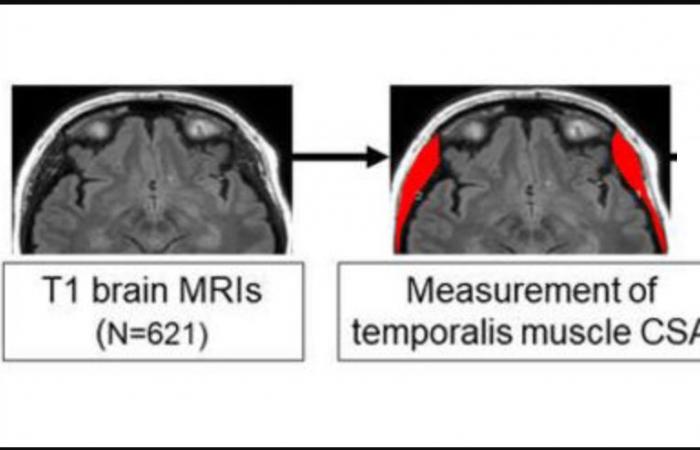Is there a link between the loss of temporalis muscle mass and the occurrence of Alzheimer’s disease? This is what American researchers tried to prove in a study that they presented at the RSNA 2024 congress. From a segmentation of the temporalis muscle on brain MRI images, they were able to identify muscle loss which would be a warning sign of the onset of Alzheimer’s disease.
Humans continue to lose skeletal muscle mass as they age. This age-related skeletal muscle loss is often observed in elderly people suffering from dementia due to Alzheimer’s disease, but no link has apparently been established between these two phenomena.
A link between loss of temporalis muscle mass and the occurrence of Alzheimer’s disease
A study presented at the 2024 RSNA congress attempted to find out whether temporalis muscle loss, i.e. the muscle responsible for movement of the mandible, was actually associated with an increased risk of dementia due to Alzheimer’s disease in this population, given that the thickness and temporalis muscle area can be an indicator of muscle loss throughout the body.
« Measuring temporalis muscle size as a potential indicator of generalized skeletal muscle status provides an opportunity for quantification of skeletal muscles without cost or additional work in older adults who have undergone brain MRI for a neurological disease, such as mild dementiaexplains the study’s lead author, Dr. Kamyar Moradi, a postdoctoral researcher in the Russell H. Morgan Department of Radiology and Radiological Sciences at the Johns Hopkins University School of Medicine in Baltimore, Maryland, USA. This is the first longitudinal study demonstrating that skeletal muscle loss can evoke the development of dementia. »
Segmentation of the temporalis muscle on brain MRI images to support research
For this multidisciplinary study, Dr. Moradi and colleagues used baseline brain MRI scans from the Alzheimer’s Disease Neuroimaging Initiative cohort to quantify skeletal muscle loss in 621 participants without dementia (mean age 77 years). They manually segmented the bilateral temporalis muscle on MRI images and calculated the total cross-sectional area (CSA) of these muscles.
Participants were classified into two distinct groups: large CSAs (131 participants) and small CSAs (488 participants). Outcomes included subsequent incidence of Alzheimer’s disease dementia, change in cognitive and functional scores, and changes in brain volume between groups. Median follow-up was 5.8 years.
Detection of temporalis muscle loss could be a warning sign of the onset of Alzheimer’s disease
According to their analysis, a smaller temporal CSA was associated with a higher risk of incidence of dementia due to Alzheimer’s disease, but also with a greater decrease in the composite score of memory, the score of the questionnaire of functional activity and structural brain volumes during the follow-up period.
« We found that older people with smaller skeletal muscles are about 60% more likely to develop dementia, after adjusting for other known risk factors. », Adds Professor Marilyn Albert, co-lead author of the study and professor of neurology. Dr. Shadpour Demehri, co-senior author and professor of radiology, reports that this muscular change can be opportunistically analyzed by any conventional brain MRI, even when performed for other purposes, without incur additional costs or charges.
This work shows that early detection through readily available brain MRI could enable rapid interventions to combat skeletal muscle loss, such as physical activity, resistance training and nutritional support. “ These interventions can help prevent or slow muscle loss and, therefore, reduce the risk of cognitive decline and dementia », concludes Dr Demehri.
Paco Carmine






